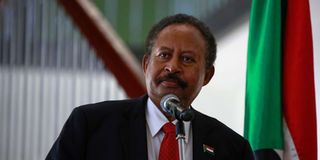Sudan declares economic emergency as currency plunges

Sudanese Prime Minister Abdalla Hamdok addresses the press after meeting with his Egyptian counterpart (unseen) in Sudan's capital Khartoum, on August 15, 2020.
What you need to know:
- In a Thursday press conference, Finance Minister Heba Ali blamed the sharp dollar rise on "systematic sabotage" by currency exchange market manipulators, official news agency SUNA reported.
- The crisis was further aggravated by weeks-long virus lockdown measures in the capital Khartoum and neighbouring cities.
- Gold is Sudan's leading export item, and 93 tonnes were produced in 2018, but the country is a victim of massive smuggling of the precious metal.
Khartoum,
Sudan has declared a state of emergency to avert economic downturn due to the dramatic fall of its local currency against the US dollar and soaring inflation.
The decision -- reported by official news agency SUNA -- includes setting up emergency courts, enacting laws to protect the economy, and imposing harsher penalties on smugglers and a rising black market.
In a Thursday press conference, Finance Minister Heba Ali blamed the sharp dollar rise on "systematic sabotage" by currency exchange market manipulators, official news agency SUNA reported.
The Sudanese pound has plunged from 50 to 240 against the dollar in the year since a transitional government took over after the April 2019 fall of autocrat Omar al-Bashir.
In July, Sudan recorded a year-on-year inflation rate of 143 per cent, according to the central bank.
Economic hardship -- which triggered the anti-Bashir protests in December 2018 that led to the longtime president's ouster -- remains a pressing challenge in Sudan.
Key factors
The crisis was further aggravated by weeks-long virus lockdown measures in the capital Khartoum and neighbouring cities.
Gold is Sudan's leading export item, and 93 tonnes were produced in 2018, but the country is a victim of massive smuggling of the precious metal.
On Thursday, Justice Minister Nasreddine Abdelbari said the government hardened smuggling penalties from one month to 10 years in jail.
Government spokesman Faisal Salih said the hike in the exchange rate was the result of "deliberate sabotage" and "a war on the revolution."
"The dollar price increases are doctored by those whose interests were harmed by the revolution and the change," he said.
Prime Minister Abdalla Hamdok had said his government needs $8 billion to rescue the ailing economy.
But in June, international donors pledged only $1.8 billion in aid to Sudan's transitional authorities.
The Sudanese economy has suffered from the country's inclusion on Washington's terror blacklist, decades-long US sanctions and the 2011 secession of the country' oil-rich south.
The transitional administration has been campaigning for Sudan's reintegration into the international community to bolster its economy.





